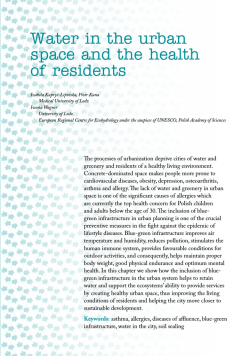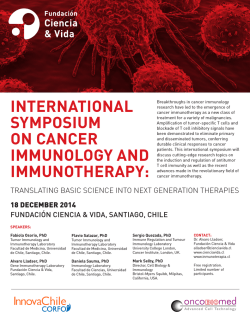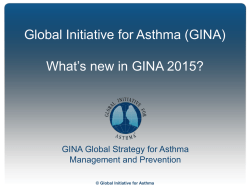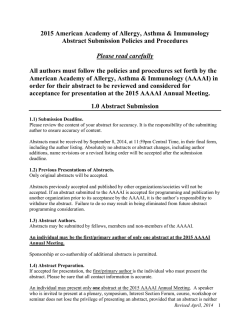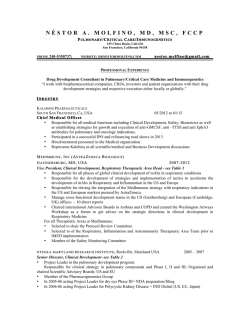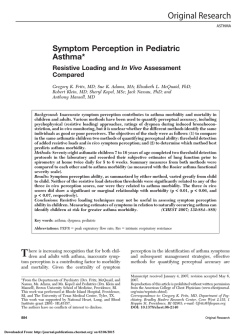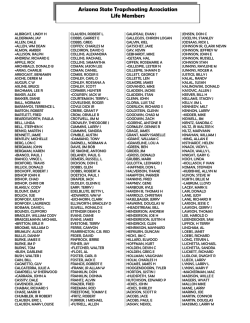
Elliott Middleton Memorial Lectureship 2015
The Elliott Middleton Memorial Lectureship Elliott Middleton’s interest in research began early in his career, when as a medical student at Columbia he was awarded a Medical Research Fund Student Fellowship. His research during this period led to a publication with an eminent member of the Columbia faculty, Dr Beatrice Seegal. After his internal medicine residency at the Presbyterian Hospital in New York, Middleton worked in the laboratory of the renowned immunochemist, Dr Michael Heidelberger. Here Middleton developed the laboratory skills and knowledge that would enable him to conduct the research that was to occupy him for the remainder of his academic career. He subsequently spent 2 years at the National Institutes of Health, followed by 2 years at the Roosevelt Hospital in New York. Over the next decade, during which he was in part-time private practice, he was actively involved in allergy research at Columbia and Roosevelt. His investigative efforts during this period focused on the various biochemical factors that governed the in vitro release of histamine from animal and human peripheral blood leukocytes. This research resulted in the publication of 30 articles in major scientific journals. In 1969 Middleton moved to Denver to become the Director of Clinical Services and Research at the Children’s Asthma Research Institute and Hospital (CARIH). During the eight years he spent in Denver he studied adrenergic-cholinergic “imbalance” in allergic reactions and asthma, αadrenergic effects on leukocyte function in asthmatic individuals, and the biochemical basis for the modulation of allergic reactions by drugs. During this time he served as the President of the American Academy of Allergy, Asthma and Immunology. In 1976, he moved to the State University of New York at Buffalo, where he was appointed Professor of Medicine and Director of the Allergy Division, succeeding Dr Carl Arbesman. During the two decades that he worked in Buffalo, Middleton developed an interest in the effects of ubiquitous family of plant compounds knows as flavonoids. The latter are responsible for the yellow, orange, and red pigments found in many foods, flowers, tea and wine. In a series of 30 publications beginning in 1982, he elucidated the role of various plant flavonoids on mammalian cell systems. His research revealed flavonoid effects on enzyme activities and in particular their role as modulators of various functions of immune and inflammatory cells. As a result of his work, he became an internationally recognized expert on flavonoids, which are currently receiving attention for their antioxidant, antiviral, antitoxic, antineoplastic, and other potentially important properties. An exhaustive review of the flavonoids, with more than 1000 references, was submitted for publication shortly before his death and published in the Pharmaceutical Review in December 2000. Most practicing allergists will recognize Elliott Middleton for his editorial talents as editor of the Journal of Allergy and Clinical Immunology from 1983 to 1988 and as the senior editor of the first four editions of the two-volume textbook Allergy: Principles and Practice. In addition to his research and editorial accomplishments, Middleton was a fine clinician and outstanding teacher, as the 75+ fellows he mentored during his career will attest. 2015 marks the 14th year of the Elliott Middleton Memorial Lectureship. It will be presented in Symposium Session 3306: Comparative and Implementation Research in the Management of Asthma: The Wave of the Future on Sunday, February 22, 2015: 10:45 am 12:00 pm. The Elliott Middleton Memorial Lectureship - Michael Schatz, MD MS FAAAAI Dr. Schatz received his M.D. degree from Northwestern University Medical School, Chicago, Illinois, where he also completed his Internal Medicine Residency and his Fellowship in Allergy-Immunology. Dr. Schatz has also received a Master’s of Science degree in Epidemiology from the Harvard School of Public Health. He is board certified in Internal Medicine and AllergyImmunology. He has been a Staff Allergist at Kaiser-Permanente Medical Center in San Diego since 1977, where he served as Chief of the Allergy Department from 2000 through 2011. Dr. Schatz is also a Clinical Professor in the Department of Medicine at the University of California, San Diego School of Medicine. Dr. Schatz is a Past President of the American Academy of Allergy, Asthma, and Immunology (AAAAI), and he serves as the AAAAI Principal Investigator for the Vaccines and Medications in Pregnancy Surveillance System (VAMPSS). He is also the current Chair of the Safety Monitoring Committee of the Asthma and Allergy Branch of the National Institute of Allergy and Infectious Diseases. Dr. Schatz has published 282 articles and edited three books in the field of Allergy-Immunology, and is currently Editorin-Chief of The Journal of Allergy and Clinical Immunology: In Practice.
© Copyright 2026
![1 [Billing Code: 4140-01-P] DEPARTMENT OF HEALTH AND](http://s2.esdocs.com/store/data/000481678_1-ace6079cd3a136722e5d2fb9067d8877-250x500.png)
